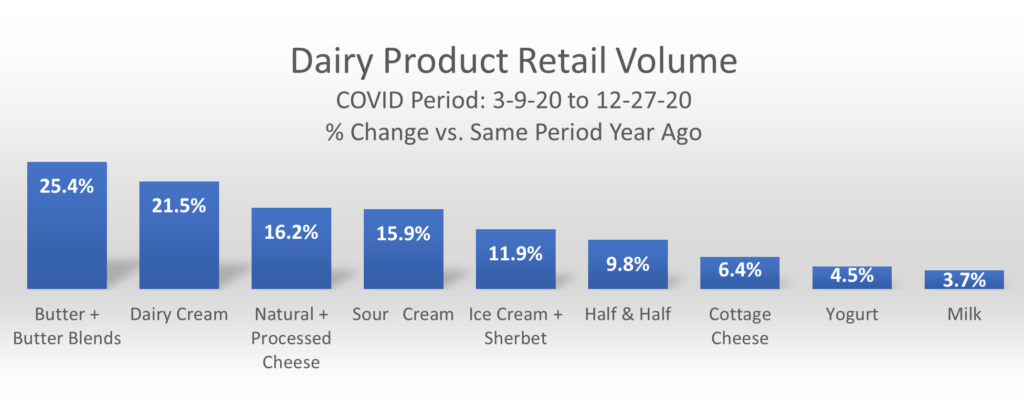It would be very difficult to exaggerate the extent of the challenges that the dairy industry, and the nation, has faced in the past year – and those challenges are far from over. But it’s also true that the promise of 2021 shouldn’t be underestimated. A new Congress and a new administration are getting to work. With bipartisanship perhaps more important than ever, it’s crucial that policymakers share a genuine desire to get beyond present difficulties and hit the ground running.
At the National Milk Producers Federation, that’s exactly what we are doing.
Our spirit of getting things done ranges across efforts in advancing legislation, regulatory policies, trade initiatives, and on-farm best practices. Here’s a glimpse of just a few things we’re working on.
In the new Congress, we’ll of course seek to advance dairy’s needs within COVID-19 relief legislation. Even as the stimulus passed late last year begins implementation, more assistance has been proposed. We will examine the need for additional resources as the legislative process unfolds.
Child nutrition programs are up for reauthorization, offering a chance to maintain and expand dairy options in school meals and build upon the strong reaffirmation of dairy’s nutritional value in the latest Dietary Guidelines for Americans. That recognition creates potential opportunities to improve school milk offerings, and the emphasis on nutrition also helps us with the anticipated re-introduction of the Dairy PRIDE Act, which would make FDA clear up consumer confusion over the nutritional content of dairy versus plant-based products.
Agricultural labor is already on Congress’s mind, with the new Biden administration’s plan to be active on broader immigration reform. All of agriculture continues to need legislation that provides permanent legal status for current workers, and dairy needs a guest worker program that meets its unique needs as a year-round perishable product, a high volume of which comes from operations that use immigrant labor.
Climate-related legislation is another near-certainty. That will give dairy the opportunity to advance the goals of the Net Zero Initiative that NMPF and partners launched in 2019 to reduce the sector’s carbon emissions to net zero by 2050 and improve water quality. Infrastructure or tax legislation may provide helpful vehicles for changes such as an Investment Tax Credit for nutrient separation technologies that would address water quality challenges, or to incorporate bipartisan legislation introduced last year that would remove barriers to farmer participation in environmental markets.
And all of this sets the stage for the 2023 Farm Bill, which may see field hearings and stakeholder discussions as soon as next year. That will entail a review of the Dairy Margin Coverage program and other risk management tools.
While we seek advances in Congress, we will also be working with the new administration to make sure that gains from the past four years are secured and that dairy continues to advance, domestically and internationally. Tops among trade concerns will be enforcing the US-Mexico-Canada agreement, particularly regarding Canadian dairy policies and Mexican technical standards and the treatment of common cheese names.
Restoring export growth to China through full implementation of the Phase 1 U.S.-China trade agreement and ending market-damaging retaliatory tariffs on U.S. dairy exports to China will also be important. The U.S. additionally needs to reenter the Trans-Pacific Partnership, and/or negotiate comprehensive, market-opening trade agreements with key Asian markets such as Japan, Vietnam, Philippines, as well as the UK, Kenya, and many others.
NMPF, along with its partner the U.S. Dairy Export Council, will continue to encourage science-based guidelines in multilateral organizations, including Codex, FAO, WHO and the United Nations. U.S. officials will also need to address long-entrenched regulatory barriers in the European Union while countering EU Geographical Indication (GI) policies that infringe on U.S. companies’ use of common food names in markets around the world.
Domestically, the regulatory front will be active. Dairy may need to defend gains made through the Navigable Waters Rule, which last year provided common-sense solutions to waterways regulation but may be under threat. Potential rules regarding PFAS chemicals will continue to pose challenges, as will calls to include dairy farms in the FDA’s Intentional Adulteration rule, needlessly adding more red tape to farmers’ lives. All of these efforts in Washington and worldwide touch the farms owned by producers in NMPF member cooperatives – and on the farm itself, we’re also striving for effective support.
While the USDA potentially approves manufacturing for the first Food and Mouth Disease vaccine in the U.S. and implements requirements to enhance the national FMD vaccine bank, a USDA grant makes NMPF the leader in efforts to bring enhanced biosecurity and the government’s Secure Milk Supply Plan into the National Dairy Farmers Assuring Responsible Management (FARM) Program.
In protecting against Bovine Tuberculosis, NMPF is also leading a multi-stakeholder task force with USDA to develop best practices to minimize animal-to-human and human-to animal-transmission.
And with FDA beginning to phase out remaining over-the-counter antibiotics for livestock production, NMPF and FARM will remain a resource for best practices of how to manage the new environment. Opportunities abound to create a more environmentally and economically sustainable dairy industry as well: The Biden Climate Change initiative may create opportunities for carbon credit trading for farms, and that initiative could advance water quality trading as well. Meanwhile, FARM Environmental Stewardship this year is adding resources to support industry goals and continuing to promote high-caliber human resources and safety management for on-farm practices.
All these initiatives add up to an incredible array of efforts, ranging from global trade to local farms. But these are incredible times. By moving forward with clarity and dedication, we can make them better. While we will certainly face many challenges in the year ahead, dairy’s gains also promise to be many in 2021. We look forward to achieving that promise.










